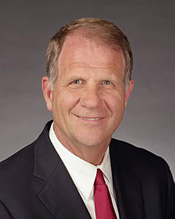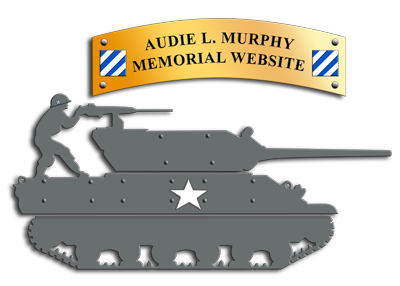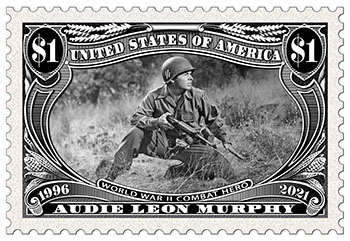Audie Murphy, Texas Warrior
Read by the Honorable Ted Poe
Proceedings and Debates of the 109th Congress, First Session
House of Representatives
|
Mr. POE. Mr. Speaker, I rise today to recognize
a native Texan and the most decorated
United States soldier of World War II.
Audie Leon Murphy was born into humble beginnings
in northeast Texas near Kingston,
Texas. He grew up in nearby Celeste, Texas.
A sharecropper's son, he was the 6th of 12
children, only 9 of whom survived to see their
18th birthday. Murphy grew up in extreme
poverty. By his ninth birthday, he had already
become an impressive rifle shot due to the
fact that he spent a good portion of his childhood
hunting rabbits and squirrels for food for
his family's table. He had no idea that his
shooting skills would be needed later.

When he wasn't hunting, he took odd jobs
around the community - on farms, gas stations
and local grocery stores. When Audie was 12,
his father left his mother and the children to
fend for themselves. He never returned and
Audie became the breadwinner for the family.
At age 16, he was working at a radio repair
shop and tragedy struck his life yet again. His
mother died and he and his siblings were left
orphans.
In desperate need of money to help support
his siblings, he tried to join the military. After
the bombing of Pearl Harbor, Audie tried to
enlist but was rejected because he was too
young. Eventually he was accepted into the
U.S. Army after being turned down by the
Navy, Marines and Army Paratroopers because
he was too short at only 5 feet, 5
inches tall and 110 pounds. He signed the papers
a few days after his 18th birthday and
was sent to training at Fort Wolters, Texas.
During one of his first training sessions, he fell
flat on his face and was knocked out cold. The
company commanders took this opportunity to
encourage him to pursue other opportunities
such as cook or bakers school but he would
have nothing of it. He persisted and was resolute
about becoming a fierce, fighting soldier.
After 13 weeks of Basic Training, he was
sent to Fort Meade, MD for advanced infantry
training. Upon finishing training, he was sent
to Morocco and eventually he was appointed
to a Second Lieutenant in 1944 where he
served in North Africa and in all European theaters.
In World War II, Murphy made a name for
himself and on one fated day he earned the
Congressional Medal of Honor and went down
in history. On January 26, 1945, Murphy is
credited with holding off two reinforced rifle
companies singlehandedly for hours. On that
day, Murphy's platoon was attacked by 6
enemy tanks and waves of infantry. To keep
his men safe, Murphy ordered his men to withdraw,
while he remained forward at his command
post and continued to give fire directions
to the artillery by telephone. Behind him,
a U.S. tank destroyer received a direct hit.
With the enemy tanks abreast of his precarious
position, Second Lt. Murphy climbed on
the burning tank destroyer, which was in danger
of blowing up at any moment, and engaged
his .50 caliber machinegun against the
enemy. He was alone and exposed to German
fire from 3 sides, but his determination and
deadly fire killed dozens of Germans and
caused their infantry to waver. The enemy
tanks, losing infantry support, began to fall
back. For an additional hour the Germans
tried any and all of their weapons to eliminate
Murphy, but he continued to hold his position
and wiped out a squad that was attempting to
sneak up unnoticed. Germans reached as
close as 10 yards, only to be mowed down by
his fierce fire. Wounded in one leg, Murphy
continued the single-handed fight until his ammunition
was exhausted. His directing of artillery
fire killed or wounded about 50 enemy
combatants.
Second Lt. Murphy's unconquerable courage
and his refusal to give up saved his company
from destruction, and enabled it to protect
and hold the woods which had been the
enemy's objective. He was a legendary and
heroic American. In the end, he was credited
with killing more than 240 German soldiers.
Because of his valor in combat and action
above and beyond the call of duty, he received
the Congressional Medal of Honor and
every other medal that the Army awards. He
earned the Silver Star twice in three days,
three Purple Hearts, and the Distinguished
Service Cross. He even received 5 decorations
that were presented to him by Belgium
and France. When he was discharged, his
face was on the front page of Life magazine
and when he finally made it home, he was still
not even 21 years old yet.
He finished WWII as a liaison officer, and
returned to Texas after the war.
Upon return, Audie became famous not only
for his heroic war actions but he also hit the
big screen and made the move to Hollywood.
He starred in more than 40 Western films and
even played the part of himself when his autobiography,
"To Hell and Back Again" was
made into a movie. He also wrote more than
17 country and western songs.
Sixty years ago today, Audie was released
from the Army as an active member and reassigned
to inactive status. His final rank was
Major in the Texas National Guard.
After all that he went through, Audie still
maintained that his medals belonged to his
entire company and that he was just, "another
man." He never really cared about the medals
or glory, just the men of his unit and those he
left buried and missing across Europe. His son
Terry even said that he was always embarrassed
to be called a hero. He always said
that the real heroes where those "who didn't
come back." He once said, "I believe in all the
men who stood up against the enemy, taking
their beatings without whimper and their triumphs
without boasting. The men who went
and would go again to hell and back to preserve
what our country thinks right and decent.
My Country, America!"
Audie was killed in a plane crash, on May
30, 1971. He left behind his wife of 20 years,
2 sons, a wealth of family and friends and a
legacy that will live on forever.
|







